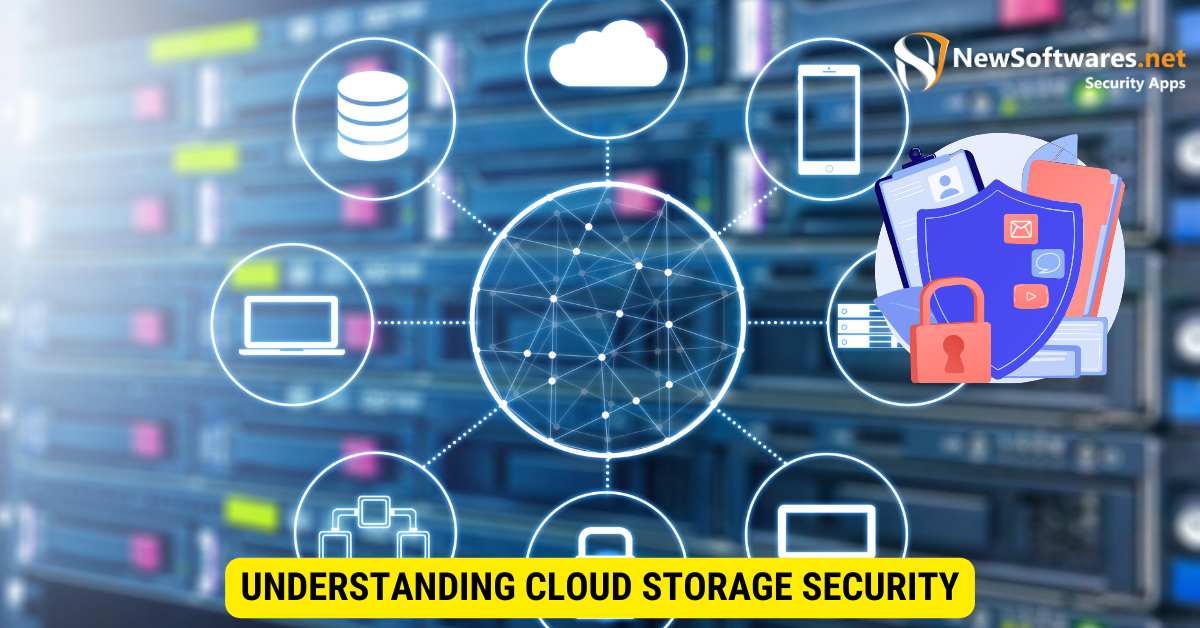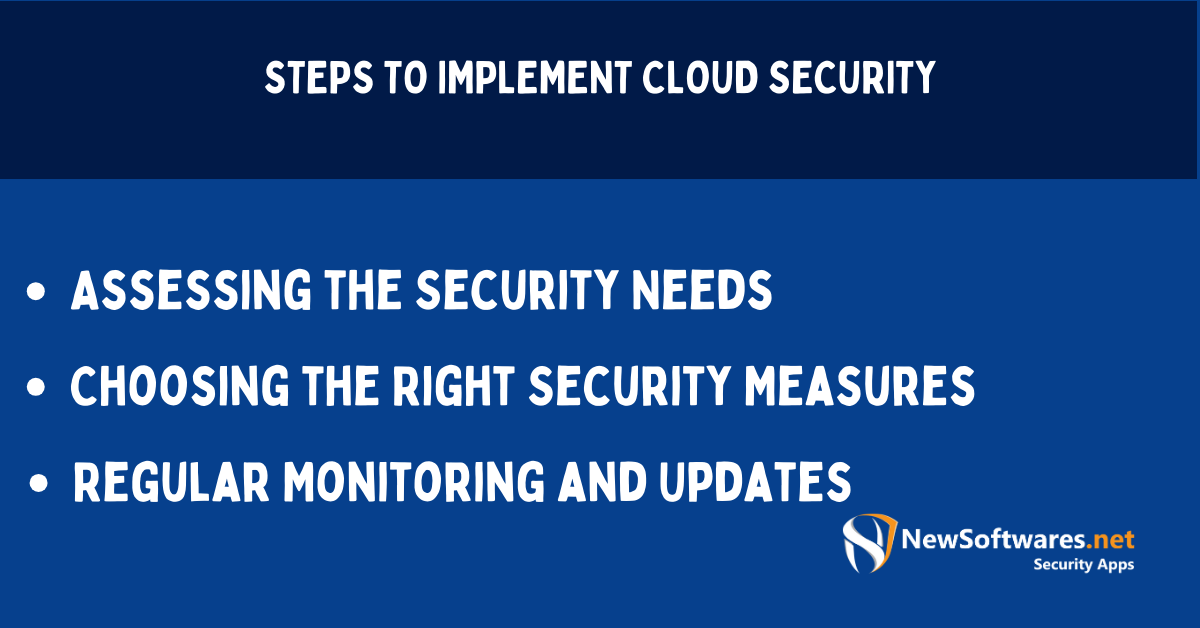Companies secure their data in the cloud through encryption, multi-factor authentication, access controls, regular audits, and by working with cloud service providers’ security protocols.
In today’s digital age, where data is a vital asset for every organization, the security of this data becomes paramount. With the increase in cloud computing, many companies are transitioning to cloud storage solutions to store and manage their data. However, this shift also brings forth concerns about the security of data stored in the cloud. I will explore how a company can apply security measures to protect the data they store in the cloud.
Understanding Cloud Storage Security

Before delving into how companies can secure their data in the cloud, it is vital to understand the basics of cloud storage. Cloud storage is a method of storing data on remote servers accessed via the internet rather than locally on physical devices. It offers numerous benefits, including scalability, cost-efficiency, and easy accessibility. However, these benefits also come with security risks that must be addressed.
The Basics of Cloud Storage

Cloud storage operates through a network of servers spread across different locations. This decentralized infrastructure ensures redundancy and high availability of data. When a company uploads data to the cloud, it gets distributed across multiple servers for backup purposes. This redundancy protects against data loss due to hardware failures or natural disasters.
Furthermore, cloud storage providers invest heavily in state-of-the-art data centers with advanced security measures. These data centers are designed to withstand physical threats like fire, floods, and unauthorized access. They employ security personnel, surveillance cameras, and access control systems to ensure the physical security of the servers and the data stored within them.
Moreover, cloud storage providers implement security measures to protect the data stored on their servers. They use encryption techniques to safeguard the data during transmission and at rest. Encryption safeguards that even if someone intercepts the data during transit or gains unauthorized access to the servers, they cannot decipher the information without the encryption keys.
Access controls and authentication mechanisms are also employed to safeguard that only authorized individuals can access the data. Cloud storage providers offer various authentication methods, such as passwords, multi-factor authentication, and biometric authentication, to verify the identity of users. These measures help prevent unauthorized access and protect against data breaches.
Importance of Security in Cloud Storage
Ensuring strong security measures in cloud storage is crucial to protect sensitive company data from unauthorized access, breaches, and potential legal consequences. Companies must adopt robust security practices to maintain their data’s privacy, integrity, and availability in the cloud.
One of the key aspects of cloud storage security is data encryption. Encryption converts the data into an illegible presentation, which can only be decoded with the appropriate encryption keys. This ensures that even if someone gains unlawful access to the data, they cannot make sense of it without the encryption keys.
Another important security measure is regular data backups. Cloud storage providers often have automated backup systems that regularly create copies of the data. These backups serve as an extra layer of protection against data loss. In the event of accidental deletion, hardware disappointment, or a cyber attack, companies can restore their data from the backups and minimize the impact on their operations.
Furthermore, companies should implement strong access controls and user management practices. This includes regularly reviewing and updating user permissions, revoking access for employees who no longer need it, and enforcing strong password policies. By limiting access to only authorized individuals and regularly monitoring user activity, companies can reduce the risk of unauthorized data access and potential insider threats.
Additionally, companies should consider implementing data loss prevention (DLP) solutions. DLP solutions help identify and prevent the unauthorized transmission of sensitive data. They can detect and block attempts to send confidential information outside the organization’s network, reducing the risk of data leakage and ensuring compliance with data protection regulations.
In conclusion, while cloud storage offers numerous benefits, companies must arrange security to protect their data from threats. By understanding the basics of cloud storage and implementing robust security measures, companies can leverage the advantages of the cloud while ensuring the confidentiality, integrity, and availability of their data.
Different Types of Cloud Security Measures
Companies employ various security measures tailored to their specific needs to secure data stored in the cloud effectively. Let’s explore some of the most common ones.
Data Encryption
One of the fundamental security measures is data encryption. It involves encoding the data unreadable without the corresponding decryption key. Companies can use encryption algorithms to encrypt data before uploading it to the cloud. This safeguards that even if unauthorized individuals increase access to the data, they cannot decipher it without the encryption key.
Data encryption delivers an additional layer of defense for sensitive information stored in the cloud. It helps safeguard data from potential breaches, ensuring that even if the data is compromised, it remains unreadable and unusable to unauthorized parties. Encoding algorithms, such as Advanced Encryption Standard (AES), are widely used to secure data in transit and at rest in the cloud.
Identity and Access Management
Identity and admittance management (IAM) systems are vital in controlling access to cloud storage. IAM allows companies to define user roles and permissions, ensuring that only official individuals can access specific data and perform certain actions. By implementing strong authentication mechanisms like multi-factor authentication, companies can enhance an additional layer of security to their cloud storage.
With IAM, companies can manage user identities, enforce access policies, and track user activities within the cloud environment. This helps prevent illegal access and reduces the risk of data breaches. IAM systems also enable companies to streamline user provisioning and de-provisioning processes, ensuring access privileges are granted or revoked promptly when needed.
Security Information and Event Management
Security Information and Event Management (SIEM) systems collect and analyze security-related data from various sources, including cloud storage systems. These systems help detect and respond to security incidents promptly. They provide real-time monitoring, threat detection, and incident response capabilities, enabling companies to address security issues proactively.
SIEM systems utilize advanced analytics and machine knowledge algorithms to identify patterns and contradictions in the cloud environment. By relating and analyzing data from multiple sources, such as log files, network traffic, and user behavior, SIEM systems can detect potential security breaches and generate alerts for further investigation. This proactive approach to security allows companies to mitigate risks and diminish the impact of security incidents.
In addition to real-time monitoring, SIEM systems offer comprehensive reporting and compliance capabilities. They help companies meet regulatory requirements by providing detailed audit logs and generating compliance reports. This ensures that companies can demonstrate their devotion to security standards and best practices when it originates to protecting data stored in the cloud.
Steps to Implement Cloud Security

Implementing cloud security requires a well-thought-out strategy and a systematic approach. Let’s explore the key steps involved.
Assessing the Security Needs
Before implementing any security measures, conducting a complete assessment of the company’s security needs is crucial. This involves understanding the sensitivity and criticality of the data stored in the cloud, identifying potential threats and vulnerabilities, and defining security objectives.
Choosing the Right Security Measures
Once the security needs are identified, companies can choose the appropriate security measures to address those needs. This may involve a combination of encryption, authentication mechanisms, intrusion detection systems, and other security tools. Selecting solutions that align with the company’s security objectives and regulatory requirements is essential.
Regular Monitoring and Updates
Implementing cloud security measures is not a one-time task. It requires continuous monitoring and updates to stay up-to-date with emerging security threats and vulnerabilities. Companies should establish processes for regular security audits, vulnerability assessments, and proactive responses to security incidents.
Challenges in Cloud Security Implementation
While cloud storage offers numerous benefits but poses certain challenges when implementing robust security measures.
Dealing with Security Breaches
Despite the best security practices, there is always a risk of security breaches, including unauthorized access, data leaks, and cyber-attacks. Companies need to have a response plan in place to handle such incidents effectively. This includes timely incident detection, containment, and recovery procedures.
Compliance with Data Protection Regulations
Data protection rules, such as the General Data Protection Regulation (GDPR), impose strict requirements on companies regarding the storage and processing of personal data. When storing data in the cloud, companies must comply with relevant regulations and implement security measures to protect personal information.
Future Trends in Cloud Security
The field of cloud security is ever-evolving, with emerging technologies promising to enhance data protection in the cloud.
Artificial Intelligence in Cloud Security
Artificial intelligence (AI) is increasingly utilized in cloud security to detect and respond to security threats in real-time. AI-powered systems can analyze vast amounts of security data, detect anomalies, and automate incident response, mitigating security risks more effectively and efficiently.
Blockchain Technology for Data Protection
Blockchain technology, known for its decentralized and tamper-resistant nature, holds great potential to enhance data protection in the cloud. By leveraging blockchain, companies can ensure the integrity and immutability of their data stored in the cloud, reducing the risk of unauthorized modifications or tampering.
Key Takeaways:
- Data stored in the cloud should be encrypted in transit and at rest.
- Companies should enforce strict access controls and multi-factor authentication.
- Regular security audits and assessments are crucial for recognizing vulnerabilities.
- Collaborating with the cloud service provider ensures alignment with their security protocols.
- Backup strategies and disaster recovery plans should be in place to mitigate data loss.
FAQs
Q: Is cloud storage less secure than on-premises storage?
A: Not necessarily. With the right security measures, cloud storage can be as secure, if not more, than on-premises storage.
Q: How can companies ensure only authorized personnel access cloud data?
A: Through strict access controls, role-based access, and multi-factor authentication.
Q: Do cloud providers offer built-in security measures?
A: Yes, many cloud providers offer security measures like encryption and firewalls, but it’s also essential for companies to implement their layers of security.
Q: What happens if a company’s cloud data gets breached?
A: Companies must follow breach notification laws, investigate the cause, rectify the issue, and take steps to prevent future breaches.
Q: Should companies back up their cloud data?
A: It’s best practice to maintain backups to ensure data integrity and availability.
Conclusion
In conclusion, securing data stored in the cloud is paramount for businesses in today’s digital land. By understanding the basics of cloud storage security, implementing appropriate security measures, and staying updated with emerging trends, companies can ensure their data’s privacy, integrity, and availability in the cloud. It is an ongoing effort that requires nonstop monitoring, proactive response to security incidents, and adherence to data protection regulations. With the right approach, companies can confidently leverage the benefits of cloud storage while safeguarding their valuable data.
